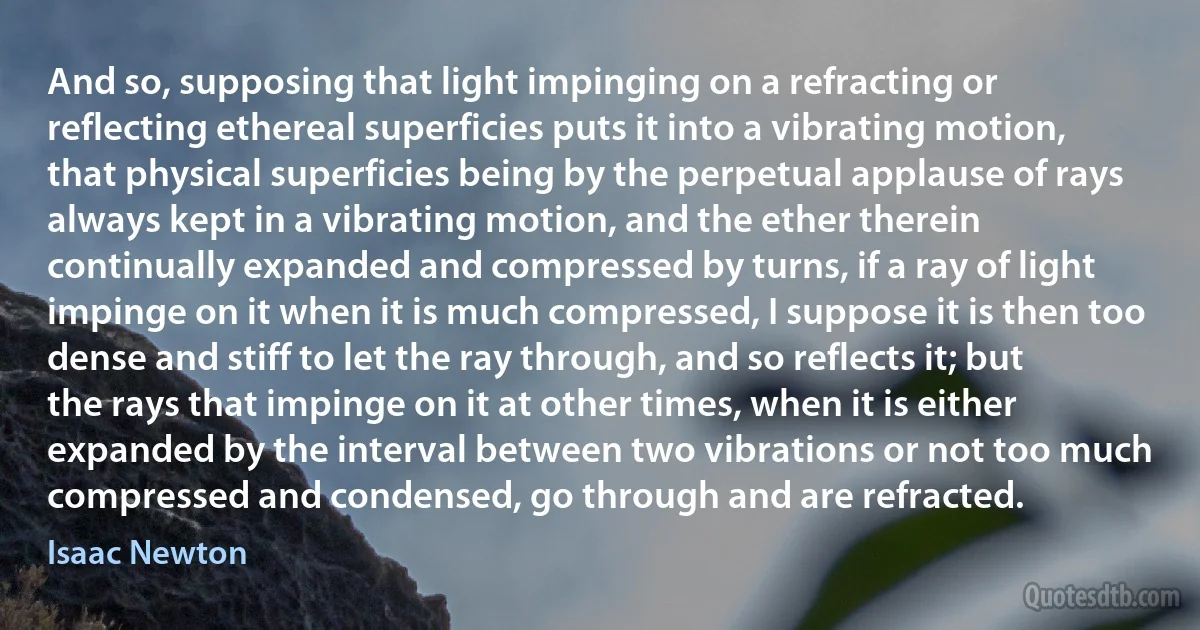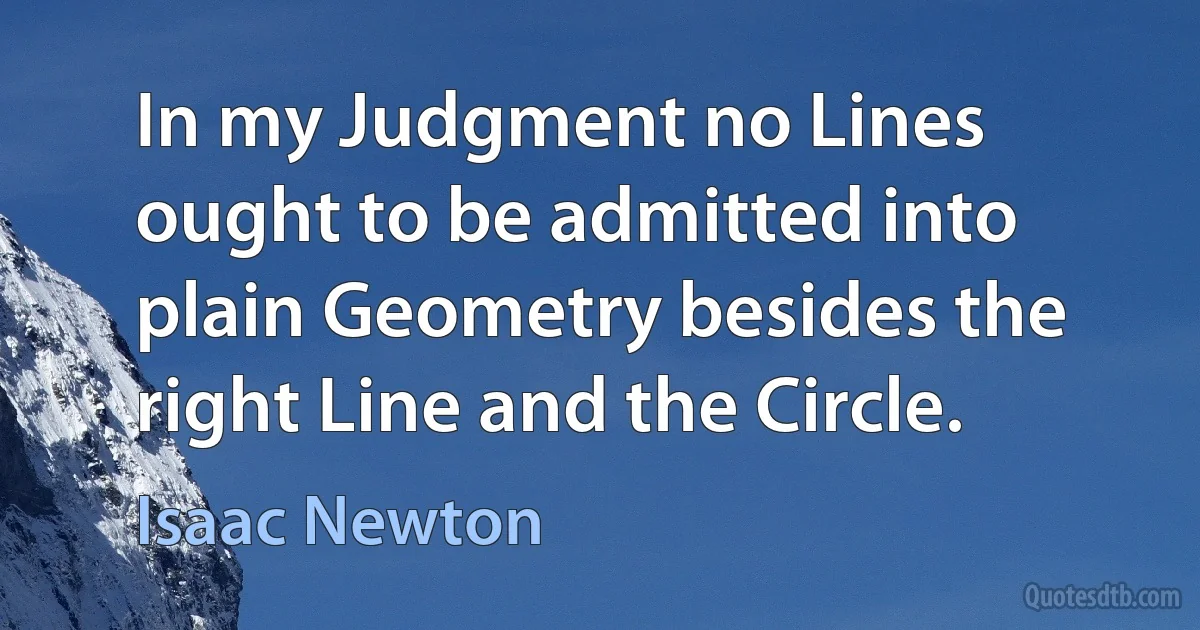Isaac Newton quotes - page 4
It seems to me, that if the matter of our sun and planets and all the matter of the universe, were evenly scattered throughout all the heavens, and every particle had an innate gravity towards all the rest, and the whole of space throughout which this matter was scattered was but finite, the matter on [toward] the outside of this space would, by its gravity, tend towards all the matter on the inside, and, by consequence, fall down into the middle of the whole space, and there compose one great spherical mass. But if the matter was evenly disposed throughout an infinite space it could never convene into one mass; but some of it would convene into one mass and some into another, so as to make an infinite number of great masses, scattered at great distances from one another throughout all that infinite space.

Isaac Newton
And so if any one would suppose that Æther (like our Air) may contain Particles which endeavour to recede from one another (for I do not know what this Æther is) and that its Particles are exceedingly smaller than those of Air, or even than those of Light: The exceeding smallness of its Particles may contribute to the greatness of the force by which those Particles may recede from one another, and thereby make that Medium exceedingly more rare and elastick than Air, and by consequence exceedingly less able to resist the motions of projectiles, and exceedingly more able to press upon gross Bodies, by endeavouring to expand it self.

Isaac Newton
After the same Manner in Geometry, if a Line drawn any certain Way be reckon'd for Affirmative, then a Line drawn the contrary Way may be taken for Negative: As if AB be drawn to the right, and BC to the left; and AB be reckon'd Affirmative, then BC will be Negative; because in the drawing it diminishes AB...

Isaac Newton
Idolatry is a more dangerous crime because it is apt by the authority of Kings & under very specious pretenses to insinuate it self into mankind. Kings being apt to enjoyn the honour of their dead ancestors: & it seeming very plausible to honour the souls of Heroes & Saints & to believe that they can heare us & help us & are mediators between God & man & reside & act principally in the temples & statues dedicated to their honour & memory? And yet this being against the principal part of religion is in scripture condemned & detested above all other crimes. The sin consists first in omitting the service of the true God.

Isaac Newton
The Ellipse is the most simple of the Conic Sections, most known, and nearest of Kin to a Circle, and easiest describ'd by the Hand in plano. Though many prefer the Parabola before it, for the Simplicity of the Æquation by which it is express'd. But by this Reason the Parabola ought to be preferr'd before the Circle it self, which it never is. Therefore the reasoning from the Simplicity of the Æquation will not hold. The modern Geometers are too fond of the Speculation of Æquations.

Isaac Newton
The second and third Empires, represented by the Bear and Leopard, are again represented by the Ram and He-Goat; but with this difference, that the Ram represents the kingdoms of the Medes and Persians from the beginning of the four Empires, and the Goat represents the kingdom of the Greeks to the end of them. By this means, under the type of the Ram and He-Goat, the times of all the four Empires are again described: I lifted up mine eyes, saith Daniel, and saw, and behold there stood before the river [Ulai] a Ram which had two horns, and the two horns were high, but one was higher than the other, and the higher came up last.

Isaac Newton
Rational mechanics must be the science of the motions which result from any forces, and of the forces which are required for any motions, accurately propounded and demonstrated. For many things induce me to suspect, that all natural phenomena may depend upon some forces by which the particles of bodies are either drawn towards each other, and cohere, or repel and recede from each other: and these forces being hitherto unknown, philosophers have pursued their researches in vain. And I hope that the principles expounded in this work will afford some light, either to this mode of philosophizing, or to some mode which is more true.

Isaac Newton
The ancients considered mechanics in a twofold respect; as rational, which proceeds accurately by demonstration, and practical. To practical mechanics all the manual arts belong, from which mechanics took its name. But as artificers do not work with perfect accuracy, it comes to pass that mechanics is so distinguished from geometry, that what is perfectly accurate is called geometrical; what is less so is called mechanical. But the errors are not in the art, but in the artificers. He that works with less accuracy is an imperfect mechanic: and if any could work with perfect accuracy, he would be the most perfect mechanic of all; for the description of right lines and circles, upon which geometry is founded, belongs to mechanics. Geometry does not teach us to draw these lines, but requires them to be drawn; for it requires that the learner should first be taught to describe these accurately, before he enters upon geometry; then it shows how by these operations problems may be solved.

Isaac Newton
Abel was righteous & Noah was a preacher of righteousness & by his righteousness he was saved from the flood. Christ is called the righteous & by his righteousness we are saved & except our righteousness exceed the righteousness of the Scribes and Pharisees we shall not enter into the kingdome of heaven. Righteousness is the religion of the kingdom of heaven & even the property of God himself towards man. Righteousness & Love are inseparable for he that loveth another hath fulfilled the law.

Isaac Newton
Is not this Medium [æther] much rarer within the dense Bodies of the Sun, Stars, Planets, and Comets, than in the empty celestial Spaces between them? And in passing from them to great distances, doth it not grow denser and denser perpetually, and thereby cause the gravity of those great Bodies towards one another, and of their parts towards the Bodies; every Body endeavouring to go from the denser parts of the Medium towards the rarer? ...And though this Increase of density may at great distances be exceeding stow, yet if the elastick force of this Medium be exceeding great, it may suffice to impel Bodies from the denser parts of the Medium towards the rarer, with all that power which we call Gravity. And that the elastic force of this Medium is exceeding great, may be gather'd from the swiftness of its Vibrations.

Isaac Newton
In the beginning of the Jewish war in Nero's reign, the Apostles fled out of Judea with their flocks; some beyond Jordan to Pella and other places, some into Egypt, Syria, Mesopotamia, Asia minor, and elsewhere. Peter and John came into Asia, and Peter went thence by Corinth to Rome; but John staying in Asia, was banished by the Romans into Patmos, as the head of a party of the Jews, whose nation was in war with the Romans. By this dispersion of the Christian Jews, the Christian religion, which was already propagated westward as far as Rome, spread fast into all the Roman Empire, and suffered many persecutions under it till the days of Constantine the great and his sons: all which is thus described by Daniel.

Isaac Newton
Whereas in Arithmetick Questions are only resolv'd by proceeding from given Quantities to the Quantities sought, Algebra proceeds in a retrograde Order, from the Quantities sought as if they were given, to the Quantities given as if they were sought, to the End that we may some Way or other come to a Conclusion or Æquation, from which one may bring out the Quantity sought.

Isaac Newton



